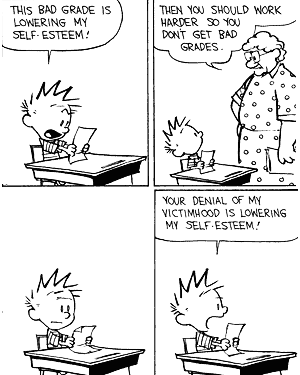Who’s to blame for this mess?
.
Trick question. Don’t blame. It makes you less able to deal with the problems of life.
Via The Blame Game: How the Hidden Rules of Credit and Blame Determine Our Success or Failure:
A study conducted by Harvard Medical School psychiatrist George Valliant showed that people who “projected,” or blamed others for their misfortunes, were much less able to adjust to the changing events in their lives… In another study, conducted by psychiatrist Leslie Phillips at Worcester State Hospital, it was found that the more people fell into the pattern of blaming others for their problems, the worse off they became in dealing with their life in general.
Blaming others can actually make you physically ill. And it makes you miserable:
…divorced individuals in the study who blamed ex-spouses, or even themselves, had more anxiety, depression and sleep disorders than individuals who blamed the way that they and their partners interacted.
Blaming external factors is even bad for corporations.
Via The Blame Game: How the Hidden Rules of Credit and Blame Determine Our Success or Failure:
One compelling study showed that organizations that blame themselves for their poor results actually achieve higher stock prices over the long term than those that blame external factors. The researchers studied 655 annual reports issued by fourteen public companies over a twenty-one-year period spanning from 1975 to 1995…
And, sadly, blaming is contagious.
Stop Blaming Yourself
Yes, you want to learn from mistakes but turns out punishing yourself has a lot of negative consequences. Forgiving yourself can help you reduce procrastination, increase creativity, and, ironically, even increase self-control.
Study after study shows that self-criticism is consistently associated with less motivation and worse self-control. It is also one of the single biggest predictors of depression, which drains both “I will” power and “I want” power. In contrast, self-compassion— being supportive and kind to yourself, especially in the face of stress and failure— is associated with more motivation and better self-control.
Forgiveness, not guilt, increases accountability.
Surprisingly, it’s forgiveness, not guilt, that increases accountability. Researchers have found that taking a self-compassionate point of view on a personal failure makes people more likely to take personal responsibility for the failure than when they take a self-critical point of view. They also are more willing to receive feedback and advice from others, and more likely to learn from the experience.
Resisting blame makes you more productive and happier.
Via The Winner’s Brain: 8 Strategies Great Minds Use to Achieve Success:
A study conducted in Diego’s Pizzagalli’s Harvard-based Affective Neuroscience Laboratory suggests that those who tolerate mistakes show lower activity in the anterior cingulate cortex — the part of the brain that is responsible for monitoring conflicts among different brain signals and that processes the significance of emotional events — and are able to move on to the next task far more easily than those who don’t tolerate their mistakes very well. In fact, those who become overly upset by the errors they make — i.e., failures — may experience more symptoms of anxiety and depression than others.
How can we resist the urge to blame?
When you want to blame yourself, try to find a benefit in the failure.
Via The Winner’s Brain: 8 Strategies Great Minds Use to Achieve Success:
Reframe a failure to find the benefit, even if it’s just a tiny nugget… Sarah Banks and colleagues have provided fMRI evidence that this act of consciously putting a positive spin on things actually changes brain activity patterns, specifically by engaging areas of the prefrontal cortex, which in turn dampens the response from the amygdalae. Consummate reformers like Wyeth and Meili seem able to tame their amygdalae, and thus negative thoughts, in order to translate even the most difficult circumstances into an affirmative challenge.
Learn from it and move on. Experts don’t waste time with blame. They see what they’re doing wrong and use it as information to improve.Via The Talent Code: Greatness Isn’t Born. It’s Grown. Here’s How:
“Our predictions were extremely accurate,” Zimmerman said. “This showed that experts practice differently and far more strategically. When they fail, they don’t blame it on luck or themselves. They have a strategy they can fix.”
Admitting error and using it to get better is a sign of a great team.
Via The Blame Game: How the Hidden Rules of Credit and Blame Determine Our Success or Failure:
What surprised Edmondson and her fellow researchers was that the most cohesive and best-led medical teams and institutions actually reported more errors than their counterparts… the higher-functioning teams were more willing to disclose their errors and, therefore, to learn from and avoid repeating them.
What about when you want to blame others?
We blame the victim because we want to believe the world is fair and just. It’s too depressing to think otherwise, right? When we see terrible things happen to innocent people, it’s much easier to believe that it’s the person’s fault than to radically shift our worldview.
Consider that the situation might have been caused by their circumstances, not their personality. Is someone angry and freaking out at you? Assume they are having a bad day, not that they are a bad person.
Our brains naturally tend to assume things are deliberate. When you act badly you say it’s because of a mood; when others do the same you say it’s because they’re rotten to the core. Give others the same benefit of the doubt you give yourself.
Join 45K+ readers. Get a free weekly update via email here.




